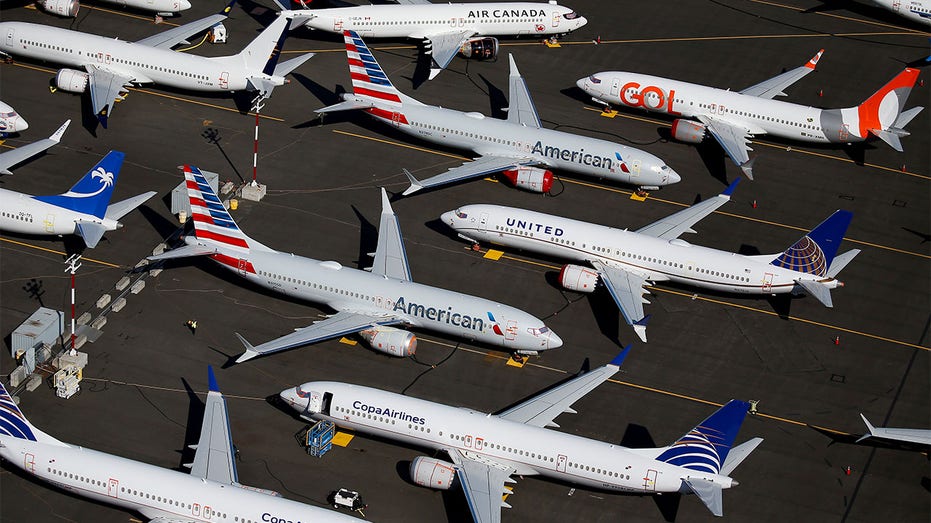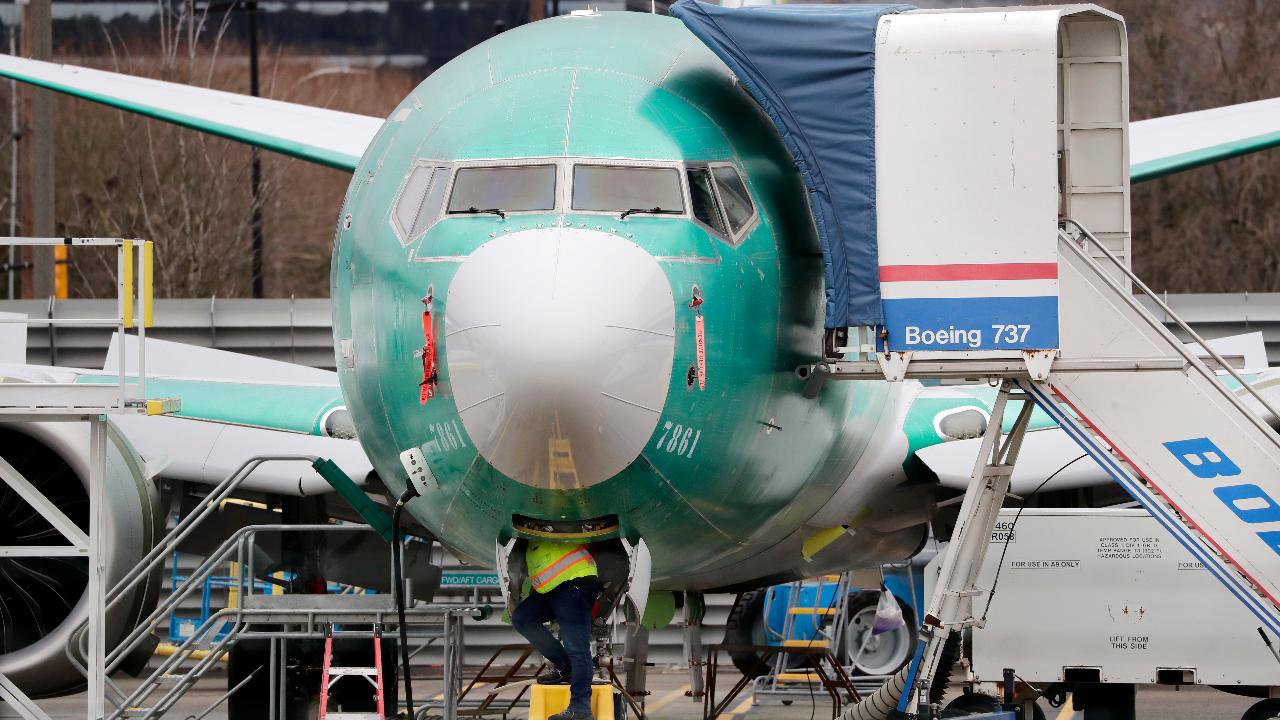Prosecutors, regulators probe Boeing 737 Max production issues
Company’s inspections have found debris left in roughly half of undelivered 737 Max jets
Boeing Co. faces criminal and civil scrutiny into years of widespread quality-control lapses on its 737 MAX assembly line, according to people familiar with the details, potentially exposing the plane maker to greater legal liability than previously anticipated by industry and government officials.
The inquiries build on a federal grand-jury investigation into hazardously designed flight-control systems, these people said. As part of the expanded probes, Justice Department prosecutors and federal air-safety regulators have been scrutinizing potentially significant safety problems stemming from 737 MAX production missteps, these people said.
BOEING OUTLINES TERMS OF VOLUNTARY LAYOFFS, FUTURE OF AIR TRAVEL INDUSTRY
The grand jury probe has focused largely on what certain Boeing employees told Federal Aviation Administration officials about the dangers of a faulty stall-prevention feature before it led to two fatal MAX crashes in less than five months and prompted the March 2019 grounding of the global fleet, according to people familiar with the matter.
But simultaneously, the people familiar with the inquiries said, DOJ prosecutors and FAA investigators also have been examining factory problems that raise red flags about the Chicago plane maker’s compliance with mandatory production rules and safeguards. Boeing found debris mistakenly left behind by workers in fuel tanks or other interior spaces of approximately half of the MAX aircraft it inspected starting last November, according to a company spokesman. Another person briefed on the details said most of the undelivered planes have been inspected.
Neither the Justice Department’s interest in MAX assembly issues nor the extent of debris discovered inside undelivered MAX planes has been reported before. Industry and government experts say such debris, including tools, rags and other materials, poses potentially serious safety concerns when lodged inside fuel tanks or scattered around compartments or other interior spaces of airliners.
BOEING 737 MAX FACES NEW SOURCE OF DELAY – CORONAVIRUS
The FAA is pursuing possible civil-enforcement action and is considering proposing a multimillion-dollar fine against Boeing regarding the debris issue, according to the person briefed on the details. The agency also is drawing up plans for stepped up government oversight and enhanced assembly-line inspections amid anticipated resumption of MAX production in coming months, the person said.
A Boeing spokesman said the inspection results prompted an internal investigation and immediate corrective actions, which are being implemented across all commercial airplane programs. As a precautionary measure, the spokesman said, Boeing recommended that all 737 MAX operators inspect fuel tanks for debris and provided detailed instructions for those checks.
No final regulatory decisions have been made by the FAA, the person said. On Monday an agency statement in response to a Wall Street Journal inquiry said that all of the issues discovered during continuing review of the 737 MAX will be resolved to the FAA’s satisfaction before the plane is allowed to fly again. Two months ago, when Boeing for the first time publicly acknowledged debris problems with MAX aircraft, the agency said it stepped up its oversight of the manufacturing process and planned further action as appropriate, based on additional inspection results.
A Justice Department spokesman declined to comment.

Grounded Boeing 737 MAX aircraft are seen parked in an aerial photo at Boeing Field in Seattle, Washington, U.S. July 1, 2019. (Reuters/Lindsey Wasson)
Boeing has said employees initially discovered the slip-ups—usually referred to as foreign-object debris, or FOD—in late November. The revelation showed Boeing’s quality-assurance protocols were falling short at its Renton, Wash., factory after similar flaws had surfaced in production of its military refueling tanker.
The Seattle Times previously reported that DOJ criminal investigators were gathering information about potential manufacturing problems at a South Carolina plant where Boeing builds its 787 Dreamliner model.
Early inspection results of MAX jets, reported in February by The Wall Street Journal, covered some 50 aircraft and indicated roughly two-thirds of them had debris in their fuel tank, including tools, rags and boot coverings. Such items can clog fuel lines and damage sensors, pumps or interior linings. Boeing is storing about 400 MAX jets awaiting delivery.
In its statement Monday, Boeing also said it has incorporated additional training for workers and updated debris-prevention audits. And the company added that additional checks are in place as part of procedures to close up fuel tanks.
GET FOX BUSINESS ON THE GO BY CLICKING HERE
The company continues to stress the importance of the issue. Earlier this month, Gary McCulley, Boeing’s 737 manufacturing-operations leader, was promoted to a new role as vice president for manufacturing and safety in the company’s commercial-airline division. The division’s chief, Stan Deal, said in an internal memo he was counting on Mr. McCulley for “FOD-free” production.
The separate DOJ and FAA investigations have both included interviews of Ed Pierson, a former production supervisor in Renton who has alleged a pattern of assembly-line problems stretching back to 2018. Mr. Pierson’s allegations, provided to the FAA’s leadership in the fall of 2019 and detailed in testimony before the House Transportation Committee three months later, range from fatigued workers to sloppy workmanship to chaotic assembly-line practices.
Eight months before Mr. Pierson’s public appearance on Capitol Hill, he spelled out his allegations to criminal investigators, according to his attorney, Eric Havian. Prosecutors and Federal Bureau of Investigation agents questioned Mr. Pierson for several hours in Seattle in April 2019, according to Mr. Havian. Prosecutors also have questioned FAA officials about some of the same issues, according to the person briefed on the details.
Mr. Pierson didn’t specifically mention debris in that interview, according to Mr. Havian. But industry and government experts said the types of quality-control lapses he laid out—including understaffing and persistent problems stemming from work done out of sequence—often lead to problems with debris. According to Mr. Havian, his client considers that leaving debris inside aircraft “is just the sort of mistake that overworked factory employees are likely to make.” Months before the first MAX crash, Mr. Pierson urged senior Boeing officials to temporarily shut down 737 MAX production to resolve safety issues, he told lawmakers in December.
CLICK HERE TO READ MORE ON FOX BUSINESS
Staffers for the House panel also have been looking into why it took FAA officials six months to schedule a face-to-face interview with Mr. Pierson after he sent a letter last September to agency administrator Steve Dickson, warning about an “unstable production environment” at the Renton plant. The FAA interview occurred in late February of this year, said Mr. Havian, who described the session as thorough and in-depth.
In an interview, Mr. Havian said the panel and DOJ were “the only two entities which responded with any sense of alacrity or urgency” to his client’s repeated warnings.
In an interim report released last month about Boeing’s 737 MAX crisis, Democrats on the House panel supported Mr. Pierson’s claims of undue management prodding to ratchet up production rates. The report concluded, among other things, that there was intense financial pressure on managers as well as on workers to avoid program delays and keep output levels high, adding that committee investigators “identified several instances where the desire to meet these goals and expectations jeopardized the safety of the flying public.”




















